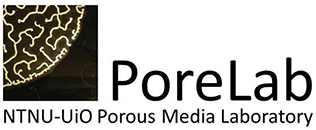
When: Wednesday 25 November at 15:00 (Oslo time)
Where: online (see below)
Title : Single- and two-phase rock typing
Speaker: Dr. Behzad Ghanbarian
Affiliation: Assistant Professor of Engineering Geology – Kansas State University
Abstract:
In the literature, numerous methods linking a characteristic pore length scale (lc) to permeability (k) and porosity () have been used to identify different classes of rocks and petrofacies (known as single-phase rock typing). One of the most-widely applied techniques is based on the Winland equation, which was first proposed empirically using experimental measurements. However, due to its empiricism, the interpretation of its parameters is not very clear. In this study, a new theoretical approach is proposed for identifying rock types based on the permeability and the formation- resistivity factor (F). Such an approach provides theoretical insights into the parameters of the Winland equation. We also show that for precise rock typing, the knowledge of the formation factor (measured routinely through petrophysical evaluation) is required. Results demonstrate that, although some rock samples might belong to the same type on the k-vs.-1/F plot, they might appear scattered on the k-vs.- plot. That is because of the fact that both k and F are complex functions of , while the latter itself is simply an index of the total pore volume, which does not necessarily provide information on the pore connectivity that contributes to both k and F.
Single-phase rock typing, however, ignores the effect of wettability and contact angle. Accordingly, a more accurate way of classifying rocks requires two-phase experiments. We propose a theoretical method based on critical path analysis and relative permeability measurements to cluster rock types based on their similarities in the characteristic pore size at the same effective saturation. To evaluate our approach, we apply pore-network simulations representing a wide range of rocks. We use the curve clustering method to classify relative permeability curves and compare the obtained results with those from single-phase rock typing. Results demonstrate the importance of two-phase rock typing.
Time: Nov 25, 2020 03:00 PM Oslo
Join Zoom Meeting
https://NTNU.zoom.us/j/96232009636?pwd=Q2dwMjRYdHlqTWl2SmIwOXpwK2pRQT09
Meeting ID: 962 3200 9636
Passcode: 310447
Join by SIP
Join by H.323
162.255.37.11 (US West)
162.255.36.11 (US East)
115.114.131.7 (India Mumbai)
115.114.115.7 (India Hyderabad)
213.19.144.110 (Amsterdam Netherlands)
213.244.140.110 (Germany)
103.122.166.55 (Australia)
149.137.40.110 (Singapore)
64.211.144.160 (Brazil)
69.174.57.160 (Canada)
207.226.132.110 (Japan)
Meeting ID: 962 3200 9636
Passcode: 310447
Join by Skype for Business
